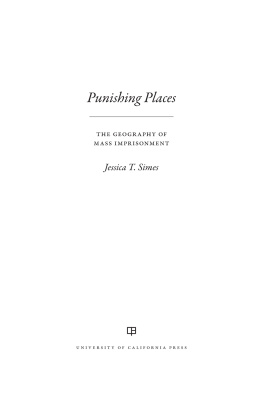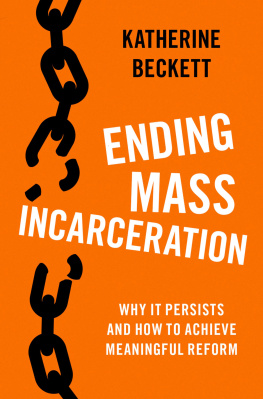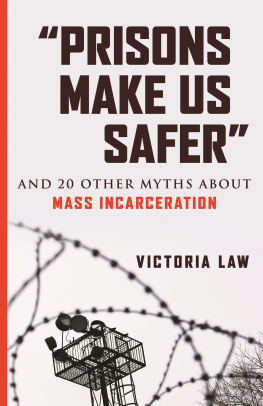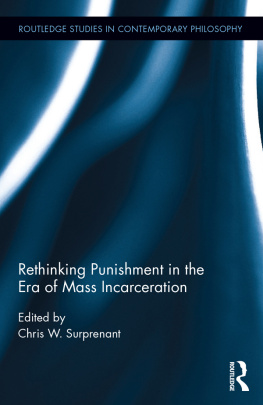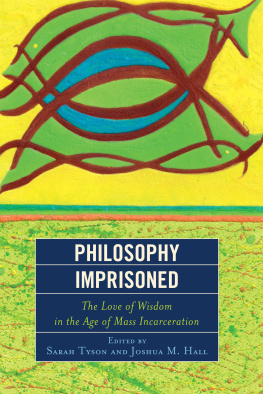Copyright 2015 Fordham University Press
All rights reserved. No part of this publication may be reproduced, stored in a retrieval system, or transmitted in any form or by any meanselectronic, mechanical, photocopy, recording, or any otherexcept for brief quotations in printed reviews, without the prior permission of the publisher.
Fordham University Press has no responsibility for the persistence or accuracy of URLs for external or third-party Internet websites referred to in this publication and does not guarantee that any content on such websites is, or will remain, accurate or appropriate.
Fordham University Press also publishes its books in a variety of electronic formats. Some content that appears in print may not be available in electronic books.
Visit us online at www.fordhampress.com.
Library of Congress Cataloging-in-Publication Data
Death and other penalties : philosophy in a time of mass incarceration / edited by Geoffrey Adelsberg, Lisa Guenther, and Scott Zeman. First edition.
pages cm
Includes bibliographical references and index.
ISBN 978-0-8232-6529-9 (cloth : alk. paper) ISBN 978-0-8232-6530-5 (pbk. : alk. paper)
1. Capital punishmentUnited States. 2. ImprisonmentUnited States. 3. PunishmentUnited States. 4. Criminal justice, Administration ofUnited States. I. Adelsberg, Geoffrey, editor.
HV8699.U5D337 2015
365'.973dc23
2014040671
Printed in the United States of America
17 16 15 5 4 3 2 1
First edition
CONTENTS
JOY JAMES
GEOFFREY ADELSBERG, LISA GUENTHER, AND SCOTT ZEMAN
BRADY HEINER
JAMES A. MANOS
RUSSELL MAROON SHOATZ AND LISA GUENTHER
DERRICK QUINTERO
GEOFFREY ADELSBERG
KELLY OLIVER
ANDREW DILTS
JULIA KRISTEVA (TRANSLATED BY LISA WALSH)
BENJAMIN S. YOST
AMI HARBIN
MATT S. WHITT
ANDREA SMITH
SARAH TYSON
ABU ALI ABDURRAHMAN
ADRIAN SWITZER
SHOKOUFEH SAKHI
LIAT BEN-MOSHE, CHE GOSSETT, NICK MITCHELL, AND ERIC A. STANLEY
Joy James
Pre- and postmortems attending U.S. society are intricately woven into histories of legal discourse and political hubris that oversee executions and penalties administered by the state. Official language seeks to shape our memories of what is right by law. The counterdiscourse prepares our minds for what is just.
On behalf of the United States and its society, an elite sector of the United States is allowed to kill and torture with impunitywhile expecting gratitude for the safety it ensures. A quick survey reveals death sentences meted out by state courts, federal courts, and military courts, and internationally by military drones that target both U.S. citizens and noncitizens. The extrajudicial killings by bureaucratic appendages of the state include police shootings, jail cell deaths, and deputized whiteness dispatching black teens. Physical deaths or killings coexist with devastating penalties. Those other penalties are administered for deviance, mundane drug offenses, property theft, and tragic assaults. Finally, there are the punishments against rebellions. This last category, which encompasses rebels and revolutionaries with lives shaped by responsibilities to confront injustice, is often diminished in its importance; hence, its transformative acts disappear from print or are rendered less viable because of the asymmetrical warfare waged against it. One need only recall the 1971 suppression of New Yorks Attica Prison rebellion for human and civil rights.
State killings, the raw expression of state violence, are macroaggressions against life and community. Democracys microaggressions, the other penalties, are expressed in intimate state violence: the invasive incarceration practices that ravage the person without immediately killing his or her body. Other penalties is a synonym for trauma: medical handcuffs and drug stupors; captivity in mental and emotional wastelands; sterilization; vulnerability to (gang) rape while institutionalized; solitary confinements evisceration of the soul and neurological stability. In the face of death and other penalties, life responsibilities have included resistance to human rights abuses, lethal injections, auction block transactions, and the caging and selling of human animals in the stock market of international commerce.
Life and other responsibilities embrace historical struggles against executioners and captors. Individual and shared lives are shaped by the political violence and terror we evade or witness, succumb to or survive. Our shared political memories of structural violence influence the political possibilities for a greater society. We would have to remember the power of resistance from the captive, not merely their victimization.
Captivity and victimization so commingle that one misses the nuanced political responses against injustice by those living lives of responsibility within and outside of formal prisons. A key responsibility is to the memory of resistance and the recall of agency among the wounded and dead despite the triumphal declaration of victory by those who administer the law.
Agency exists even in what is understood as defeat. Thus death and the other penalties never have the final word. Our history of rebellion against repression and captivity, where premature, violent death and torture are political phenomena designated for historically colonized or enslaved groups, is instructive.
Recall that the United States has, reportedly, engaged in only two mass executions. The first was in Mankato, Minnesota, during the 1862 Dakota war; there, the federal government and financial speculators vanquished indigenous fighters resisting starvation. President Abraham Lincoln shifted his attention from a very bloody killing fielda civil war fought for geographical integrityto authorize the mass hanging of thirty-two indigenous fighters accused of murder (war) and rape (apparently fabricated to justify the executions). The government made a political point that enabled economic theft and profiteering to continue; its death sentences embodied both the immediate demise of resisters and the slow death by starvation of their families and kin. During the second mass execution in Houston, Texas, in 1917, the War Department deflected its attention from its newly declared war against Germany, and World War I, to exorcise black sovereign loyalty by hanging nineteen African American soldiers and imprisoning sixty-three with life sentences for rebelling against southern racial tyranny and causing the deaths of several whites who fought against black life.
The historical ancestors in maroon camps, on reservations, in army camps seeking to either escape or belong to democracys manifest destiny reappear among the contemporary captives. Their proximity to death and other penalties shaped and shapes our political imagination and responses today. Captives have always led, intellectually and politically, although some find it impractical to follow, or even publicly acknowledge this leadership. Nonetheless, it is important to hold accurate and responsible memories of the militancy that led to international or national trials and the publics growing knowledge of state abuses.
Death and Other Penalties exemplifies living with responsibilities and diverse agencies, including those from the prison. This anthology works to resuscitate western democracy as something other than imperial and deadly. Here we read analyses, philosophies, memoirs, and epitaphs as the chapters in this book code or reformulate codes for living with responsibilities.


